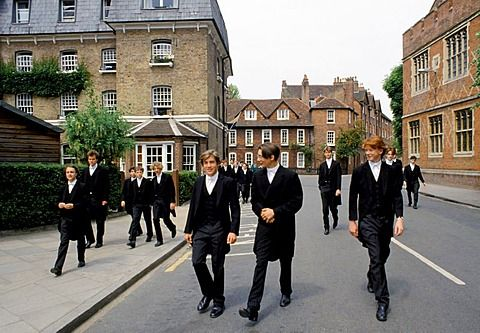

10 Universities Attended by Future Presidents and World Leaders
Higher education doesn’t just broaden your horizons — it often defines your career path and shapes future leaders. Some universities have become true “political foundries,” producing presidents, prime ministers, and statesmen who have significantly influenced — and continue to influence — the course of world history.
In this article, we’ll explore 10 universities — from world-renowned institutions like Harvard and Yale to lesser-known ones such as Uppsala University in Sweden. What unites them? Graduates of these universities have led nations, drafted laws, and reshaped the global political landscape.
Many of these universities offer financial support to talented and ambitious students who aspire to build outstanding careers and leave their own mark on history. Read on for more.
Contents:
- Harvard University
- Yale University
- Auburn University
- London School of Economics (LSE)
- La Sorbonne
- Autonomous University of Madrid (Universidad Autónoma de Madrid)
- University of Geneva (Université de Genève)
- University of Helsinki
- Uppsala University
- University of Tokyo
1. Harvard University, USA
Location: Cambridge, Massachusetts, USA (a suburb of Boston).
A bit of history:
Harvard University is the oldest institution of higher learning in the United States. It was founded in 1636 by a vote of the Massachusetts General Court and named after its first major benefactor, John Harvard, who donated his library and half of his estate to the college. Originally established to train clergy, Harvard later expanded to offer more secular programs: the medical school was founded in 1782, the law school in 1817, the graduate school in 1890, and many other departments followed.
Notable features and interesting facts:
- Harvard is known for producing a record number of U.S. presidents — eight in total.
- It has one of the largest endowments in the world — around $50 billion — which allows the university to offer generous financial aid to students in need.
- Its “need-blind” admissions policy means that an applicant’s financial situation does not affect the admissions decision.
- The university offers substantial financial aid to all students who require it (including international students). Scholarships can cover up to 100% of total expenses, including housing and meals.
Tuition costs:
Undergraduate tuition for the 2025–2026 academic year is approximately $59,320 per year. Including room, board, and fees, the total annual cost is around $87,000 (not including transportation and personal expenses).
Notable alumni:
- U.S. Presidents: John Adams, his son John Quincy Adams, Rutherford Hayes, Theodore Roosevelt, Franklin D. Roosevelt, John F. Kennedy, Barack Obama, George W. Bush.
- Pierre Trudeau — Prime Minister of Canada.
- Benazir Bhutto — Prime Minister of Pakistan.
- Ban Ki-moon — Secretary-General of the United Nations.
- Ellen Johnson Sirleaf — President of Liberia.
2. Yale University, USA
Location: New Haven, Connecticut, USA.
A bit of history:
Founded in 1701 under the name “Collegiate School” by a group of Congregationalist ministers, the institution was renamed in 1718 in honor of its benefactor, Elihu Yale. It was established as an alternative to Harvard, with a strong emphasis on spiritual and moral education. During the 19th century, Yale significantly expanded its academic offerings: the medical school was founded in 1810, the law school in 1824, and the graduate school in 1847.
Notable features and interesting facts:
- The third oldest of the nine colonial colleges in America and a member of the Ivy League.
- Known for its extensive residential college system: 14 autonomous “residential colleges,” each with its own dining halls, libraries, and facilities.
- Like Harvard, Yale follows a need-blind admissions policy and meets 100% of demonstrated financial need for all students — both domestic and international.
Tuition costs:
- Total cost (including undergraduate tuition, housing, etc.): approximately $65,000–80,000 per year.
- Tuition alone: around $47,600–59,950 per year, depending on the program.
- Room and board: approximately $10,000–20,000 per year.
Notable alumni:
Yale has produced five U.S. presidents:
- William Howard Taft — earned his BA in 1878. Later served as U.S. President (1909–1913) and Chief Justice of the Supreme Court.
- Gerald Ford — graduated from Yale Law School (LLB/JD) in 1941. He was also an assistant football coach during his studies. Served as President from 1974 to 1977.
- George H. W. Bush — completed his undergraduate degree at Yale in 1948. Served as President from 1989 to 1993.
- Bill Clinton — earned his JD from Yale Law School in 1973. Served as President from 1993 to 2001.
- George W. Bush — received his BA from Yale in 1968, then earned an MBA from Harvard. Served as President from 2001 to 2009.
3. Auburn University, USA
Location: Auburn, Alabama, USA.
A bit of history:
Founded in 1856 as East Alabama Male College by the Alabama state legislature with support from the Methodist Church, it officially opened in 1859 under its first president, William J. Sasnett. In 1872, it became a state-run institution, and by the 1960s it had evolved into a major university known for its strong research and engineering programs.
Notable features and interesting facts:
- One of the largest universities in Alabama, with more than 25,000 students and 1,200 faculty members.
- Known for its robust research in engineering and agricultural sciences; offers a variety of scholarships and grants to students.
- Vibrant student life with active Greek organizations, sports teams, and research opportunities, including an international relations conference.
Tuition costs:
(for international students, 2023–2024 academic year)
- Tuition and fees: $35,182
- Room and board: approximately $15,000
- Health insurance: $1,848
- Total estimated cost: around $52,030
Notable alumni:
- Kay Ellen Ivey — 54th Governor of Alabama (since 2017).
- Tim Cook — CEO of Apple. Earned a bachelor’s degree in industrial engineering.
4. London School of Economics and Political Science (LSE), United Kingdom
Location: Westminster, London, UK.
A bit of history:
Founded in 1895 by members of the Fabian Society — Beatrice and Sidney Webb. One of the co-founders of LSE was the famous playwright and Nobel Prize laureate George Bernard Shaw. In 1900, LSE joined the University of London. Since 2008, it has awarded its own degrees, and in 2022, it received full university status. Today, LSE is one of the world’s leading institutions in the social sciences, especially economics, political science, and international relations.
Notable features and interesting facts:
- LSE has produced 24 heads of state and government — second only to Oxford in the UK.
- More than 20 Nobel Prize laureates are affiliated with LSE.
- In 2025, LSE was named "University of the Year" by The Sunday Times, surpassing Oxford and Cambridge thanks to outstanding graduate outcomes and student satisfaction.
Tuition costs:
- Undergraduate programs for international students: approximately £26,500–£26,600 per year
- Postgraduate programs for international students: from £30,400 to £39,900 per year
- General Course (study abroad program, 2025/2026): £28,100 per year, regardless of nationality
Notable alumni:
- Ursula von der Leyen — President of the European Commission.
- Kwame Nkrumah — First Prime Minister (1952) and President of Ghana; attended LSE as a graduate student.
- Annalena Baerbock — German Foreign Minister; earned a degree in international law in 2005.
- Tsai Ing-wen — President of Taiwan; received her PhD in law from LSE in 1984.
- John F. Kennedy — U.S. President; studied at LSE as part of a study abroad program.
5. La Sorbonne, France
Location: Latin Quarter, Paris, France.
A bit of history:
La Sorbonne was founded in 1257 as a theological college of the University of Paris by Robert de Sorbon, chaplain to King Louis IX. It quickly became one of Europe’s most prestigious centers of theological and philosophical learning.
Following the French Revolution, the university was closed, but later re-established in the 19th century. Today’s Sorbonne is the result of the 1970 reform that divided the University of Paris into 13 autonomous institutions. The most direct successors of the historical Sorbonne are Sorbonne University (Sorbonne Université) and Paris 1 Panthéon-Sorbonne University (Université Paris 1 Panthéon-Sorbonne).
Notable features and interesting facts:
- Historically a hub of medieval scholasticism, later of the French Enlightenment and political thought.
- In 1968, it became a focal point of student protests, which led to the reform of the entire French university system.
- Modern Sorbonne University is particularly strong in the humanities, natural sciences, and medicine.
- Instruction is primarily in French, though an increasing number of programs are now offered in English.
Tuition costs:
(for international students, since 2019)
- Undergraduate: approximately €2,770 per year
- Master's programs: approximately €3,770 per year
Notable alumni:
- Valéry Giscard d’Estaing — President of France (1974–1981), studied economics and law at the Sorbonne.
- François Mitterrand — President of France (1981–1995), studied law and literature.
- Simone de Beauvoir — Philosopher and writer, one of the key figures in 20th-century feminism; the ninth woman to graduate from the Sorbonne.
6. Autonomous University of Madrid (Universidad Autónoma de Madrid, UAM), Spain
Location: In the Madrid suburb of Alcalá de Henares, Spain.
A bit of history:
The Autonomous University of Madrid, widely known as UAM, was founded in 1968 as a self-governing public university. It was part of a broader national effort to expand and modernize higher education in Spain during a period of significant reform. UAM quickly became one of the country’s leading research institutions, particularly in the sciences and social sciences.
Notable features and interesting facts:
- Known for its interdisciplinary approach to education and research, especially in biomedicine, economics, psychology, and political science.
- Ranked among the top 200 universities globally by QS World University Rankings.
- Home to one of the best libraries in Spain for the humanities and natural sciences.
- Maintains strong international partnerships across Europe, North and Latin America, and actively participates in Erasmus+ and other global exchange programs.
- Actively involved in applied research and collaborates with industry and government on innovation projects.
Tuition costs:
- For EU students: approximately €1,200–2,000 per year for undergraduate programs.
- For non-EU students: around €6,000 per year, depending on the program.
Notable alumni:
- King Felipe VI — King of Spain since 2014.
- Queen Sofía of Greece — former Queen Consort of Spain, wife of King Juan Carlos I and mother of King Felipe VI.
7. University of Geneva (Université de Genève), Switzerland
Location: Geneva, Switzerland. Campuses are located in the city center, near the headquarters of the UN, WHO, and other international organizations.
A bit of history:
Founded in 1559 by John Calvin as a Protestant theological seminary. By the 18th century, it had become a secular institution, and by the 19th century, it developed into a comprehensive center for higher education.
The University of Geneva is one of the oldest in Switzerland and is renowned for its commitment to humanist and international values.
Notable features and interesting facts:
- Offers strong programs in international law, political science, gender studies, medicine, and physics.
- Due to its location, it works closely with the UN, CERN, the International Committee of the Red Cross, WHO, and other global institutions.
- Courses are taught in both French and English, especially at the master's level.
- Member of the League of European Research Universities (LERU), an elite network of research universities.
Tuition Costs:
- Tuition is 500 Swiss francs per semester (approximately 1,000 CHF per year), the same for Swiss and international students.
- Living expenses (housing, insurance, food, etc.) in Geneva are high, averaging around 1,600–2,000 CHF per month.
- The university offers a limited number of scholarships for international students, including Excellence Master Fellowships.
Notable alumni:
- Micheline Calmy-Rey — President of Switzerland (2007, 2011); earned a degree in political economy from the University of Geneva.
- His Royal Highness Henri — Grand Duke of Luxembourg since 2000; studied political science at the University of Geneva.
- Maria Teresa — Grand Duchess of Luxembourg, wife of Grand Duke Henri.
- Carla Del Ponte — former prosecutor for the International Criminal Tribunals for the former Yugoslavia and Rwanda.
- Ian Fleming — author of the James Bond novels.
8. University of Helsinki, Finland
Location: Helsinki, Finland. The main campus is located in the heart of the city, near Senate Square and the Helsinki Cathedral.
A bit of history:
The university was founded in 1640 in the city of Åbo (now Turku) under the name Royal Academy of Åbo. In 1828, after a major fire in Turku, it was relocated to Helsinki and renamed the Imperial Alexander University, in honor of Russian Emperor Alexander I.
In 1917, following Finland’s declaration of independence, the university received its current name — the University of Helsinki. It is the oldest and largest university in the country.
Notable features and interesting facts:
- Considered Finland’s premier research institution and consistently ranked among the world’s top 100 universities.
- Comprises 11 faculties, including medicine, theology, social sciences, and natural sciences.
- Renowned for programs in ecology, genetics, neurobiology, and linguistics.
- Offers courses in Finnish, Swedish, and English.
- Actively involved in international exchange programs, including Erasmus+.
Tuition costs:
- Since 2017, non-EU/EEA students pay between €13,000 and €18,000 per year, depending on the program.
- For Finnish, EU, and EEA citizens, education is free.
- The university offers scholarships for international students that may cover tuition fees fully or partially.
Notable alumni:
- Tarja Halonen — President of Finland (2000–2012), the first woman to hold the office; earned a law degree from the University of Helsinki.
- Urho Kekkonen — President of Finland (1956–1982), graduated from the law faculty.
- Juho Kusti Paasikivi — President of Finland (1946–1956), earned a doctorate in philosophy and later taught at the university.
9. Uppsala University, Sweden
Location: Uppsala, Sweden — about 70 km north of Stockholm. It is one of the oldest and most renowned university towns in Scandinavia.
A bit of history:
Founded in 1477, Uppsala University is considered the first university in Scandinavia. Since its inception, it has played a crucial role in the development of Swedish education, science, and politics. Notable figures such as Carl Linnaeus (father of biological taxonomy) and Anders Celsius (creator of the Celsius temperature scale) both studied and taught here.
Notable features and interesting facts:
- A member of the prestigious Coimbra Group and U4 Network, and consistently ranks among the top 100 universities in the world.
- Strong academic reputation in medicine, ecology, physics, international law, and innovative technologies.
- More than 50,000 students attend the university, including around 4,000 international students.
- Known for academic freedom, close ties with the Nobel Committee, and high teaching standards.
Tuition costs:
- Free for students from the EU/EEA and Switzerland.
- For others: tuition ranges from 100,000 to 150,000 SEK per year (approximately €8,800–13,200).
- The university offers scholarships that partially or fully cover tuition costs.
Notable alumni:
- Carl Linnaeus — Swedish naturalist and physician, founder of modern taxonomy
- Anders Celsius — Swedish astronomer, geologist, and meteorologist, creator of the Celsius temperature scale
- Dag Hammarskjöld — Secretary-General of the United Nations (1953–1961), Nobel Peace Prize laureate (posthumously); studied law at Uppsala
- Carl XVI Gustaf — King of Sweden; spent a year studying at Uppsala University under a custom-designed program
10. University of Tokyo, Japan
Location: Tokyo, Japan — Bunkyō ward. The main campus is located near the Imperial Palace.
A bit of history:
The University of Tokyo was established in 1877 as Japan’s first national university. It was formed by merging several existing institutions during the Meiji era with the goal of creating a leading center for education and research in the country. Among its early professors were foreign experts from Europe and the United States.
Notable features and interesting facts:
- Traditionally regarded as the best university in Japan and consistently ranked among the world’s top universities.
- Almost all of Japan’s post–World War II prime ministers studied here.
Tuition costs:
- Undergraduate programs for international students cost approximately ¥535,800 per year (about $3,800 USD).
- An additional admission fee of about ¥282,000 is required.
Notable alumni:
- 18 prime ministers of Japan, including Count Katō Takaaki, Osachi Hamaguchi, and Yukio Hatoyama.
- Kiichiro Toyoda — founder of Toyota Motor Corporation.
- Yosuke Ayukawa — founder and director of Nissan Group.
Need help getting into your dream university?
The experts at ED-EX.com will support you every step of the way — from choosing a country to preparing your application documents.
You can submit a request in any convenient way:
— in your personal account
— on the page of the chosen educational institution
— or by emailing us at: support@ed-ex.com
All About Education Abroad and Beyond


How do I apply for a Bachelor's degree through ED-EX.com?


